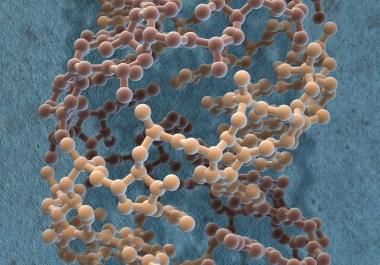2025 Warren Alpert Foundation Prize Awardees Announced

2025 Warren Alpert Foundation Prize Honors Scientists Whose Discoveries Culminated in Novel HIV Treatment
Twice-a-year injection with lenacapavir can prevent HIV infection and could speed the end of the HIV epidemic
By CHRISTEN BROWNLEE
5-minute read
At a glance:
- First-in-class medication halts HIV replication by disrupting a critical piece of the viral machinery — the capsid protein shell that protects the vial genome.
- Twice-a-year injection removes significant barriers common with other HIV treatments.
- Because the drug is used for HIV resistant to other drugs but can also prevent HIV infection in the first place, it could accelerate the end of the global HIV epidemic.
The 2025 Warren Alpert Foundation Prize has been awarded to three scientists whose discoveries culminated in the development of lenacapavir, a medication used to treat and prevent human immunodeficiency virus (HIV) and the first approved drug to disrupt a viral capsid, a critical piece of the viral machinery that allows it to replicate.
Because this therapy — more potent than any other HIV drug — is given only twice a year and can prevent HIV infection, it carries the promise to accelerate the end of the HIV epidemic.
The three recipients are:
- Tomas Cihlar, Senior Vice President of Virology at Gilead Sciences
- John O. Link, former Vice President of Medicinal Chemistry at Gilead Sciences, current Scientific Advisor at Actio Biosciences and Scientific Advisory Board member for Terremoto Biosciences
- Wesley Sundquist, Samuels Distinguished Professor and Chair of Biochemistry at the University of Utah
The $500,000 award, to be shared among the three winners, is given by the Warren Alpert Foundation in recognition of work that has improved the understanding, prevention, treatment, or curing of human disease. The prize is administered by Harvard Medical School. The award winners will be recognized at a scientific symposium on Oct. 30 hosted by Harvard Medical School. For details, visit the Warren Alpert Foundation Prize symposium website.
“Lenacapavir is a powerful example of how basic research that elucidates the structure and behavior of a virus can lead to life-changing treatments,” said George Q. Daley, dean of Harvard Medical School and chair of The Warren Alpert Foundation Prize scientific advisory board. “It reflects the best of academic-industry collaboration and marks a major step toward ending a decades-long epidemic.”
Significance of the work
About 40 million people worldwide are living with HIV, according to the World Health Organization. Despite the availability of effective antiviral medications that make HIV a manageable chronic condition, more than 1.3 million new infections occur each year, and more than 600,000 people die from HIV complications every year. Barriers that hamper access to treatments and preventive measures — as well as a persistent stigma in using them — remain serious challenges to minimizing the casualties of the virus and ending the global epidemic caused by it.
The three scientists honored with this year’s Warren Alpert Foundation Prize each played key distinct and complementary roles toward developing ways to target therapeutically the HIV capsid — the cone-shaped protein shell that protects the viral RNA genome and the enzymes needed for its replication. Based on these insights, they developed a revolutionary drug called lenacapavir that blocks the myriad functions of the HIV capsid throughout the viral replication cycle, stymieing the virus’s ability to multiply in cells. Because of its extreme potency and stability, lenacapavir only needs to be administered every six months, ridding patients of the burden of daily dosing necessary for other HIV-fighting drugs.
The drug has shown high efficacy in preventing HIV transmission and infection, and could, therefore, play a pivotal role in ending the HIV epidemic – a goal that the World Health Organization and the Joint United Nations Programme on HIV/AIDS (UNAIDS) aim to meet by 2030. In a recent clinical trial of 5,000 adolescent girls and young women in South Africa and Uganda, twice-yearly injections of lenacapavir were found to be 100 percent effective in preventing HIV infection.
“Lenacapavir isn’t just a transformative medicine, it’s a game changer,” said David M. Hirsch, director and chairman of the board of The Warren Alpert Foundation. “Removing the burden of daily pills, this twice-yearly injection gives us a real shot at stopping HIV transmission and turning the tide on the HIV epidemic. This truly captures the spirit of The Warren Alpert Foundation.”
Paving the way to a new antiretroviral therapy
HIV’s genetic material and enzymes necessary for its replication are housed in a central cone-shaped protein assembly called the capsid, which is composed of about 1,500 copies of the viral CA protein. When HIV infects a new cell, this capsid and its contents are released into the newly infected cell. The cell then copies RNA into DNA, which is permanently inserted into a host cell chromosome — a step that makes the virus nearly impossible to eradicate.
When Sundquist became a faculty member at the University of Utah in 1992, at the height of the HIV/AIDS epidemic in the United States, most researchers interested in finding new ways to treat HIV studied key enzymes involved in its replication. The vast majority of existing antiretroviral drugs function through a “lock and key” mechanism in which the drug molecule fits into a binding pocket on these enzymes, disrupting their activity.
However, Sundquist took a different path, studying the capsid. Research in his laboratory defined the architecture of the capsid and showed that even small mutations in the CA protein were detrimental to HIV replication, suggesting that the capsid might be vulnerable to inhibition by small molecule drugs.
Cihlar, a virologist, and Link, a medicinal chemist, decided to investigate targeting the HIV capsid at the biopharmaceutical company Gilead Sciences. In 2006, they launched a research program aimed at designing a drug that disrupts the assembly of the capsid. For four years, they and their colleagues searched for compounds that slowed capsid assembly. However, these efforts weren’t successful. Switching tracks, they looked for compounds that accelerated capsid assembly. This approach led to the formation of misshapen capsids and blocked intact capsids from reaching the nuclei of newly infected cells — two steps that ultimately stopped the virus from multiplying.
After six more years and thousands of design and testing cycles, their efforts culminated in the creation of lenacapavir. The drug was approved by both the U.S. Food and Drug Administration and the European Medicines Agency in 2022 for the treatment of people with HIV resistant to other therapies. In June 2025, lenacapavir was approved as a twice-a-year injection for the prevention of HIV.
Gilead Sciences announced that it has entered agreements with generic-drug makers to make and distribute lenacapavir royalty-free to 120 countries with high HIV incidence and limited resources, which could ease access and ensure availability to those who need it the most.
From the winners
“It’s a great honor to be recognized by Harvard Medical School and the Warren Alpert Foundation and to join the distinguished ranks of past Alpert Prize recipients, who are a highly accomplished and inspirational group. It is also a privilege to represent the many other basic researchers, both in our lab and in other labs, who have contributed to our understanding of the HIV capsid. Finally, it’s wonderful to share the honor with Tomas Cihlar, John Link, and Gilead, who did amazing work in developing lenacapavir.” – Wesley Sundquist
“It is a humbling experience and tremendous honor considering the relevance of the Prize and all its prior recipients, many of whom are role models and a source of great inspiration for me as a scientist. It is also a great privilege to be recognized together with two of my collaborators for many years. But first and foremost, it is a recognition of many scientists, physicians, community workers, and participants in our clinical studies who all played an important part in the discovery and development of lenacapavir.” – Tomas Cihlar
“It is an honor for me to be selected for the prestigious Warren Alpert Foundation Prize with Tomas Cihlar and Wesley Sundquist, and it is deeply meaningful to be part of the team that discovered lenacapavir. The prize is an important recognition of the role of chemistry in the creation of this lifesaving medicine. Lenacapavir’s potential for accelerating the end of the HIV epidemic is beyond what any of us could have imagined in those earliest days.” – John O. Link
The prize
The Warren Alpert Foundation Prize recognizes the research of scientists throughout the world. Including the 2025 prize, the foundation has awarded nearly $9 million to 86 individuals. Since the inception of the award in 1987, 14 honorees have gone on to receive Nobel prizes.
The 2024 Warren Alpert Foundation Prize was awarded to Renier Brentjens, Zelig Eshhar, Carl June, and Michel Sadelain for their transformational discoveries leading to the design of chimeric antigen receptor (CAR) T cells, a treatment that modifies patients’ immune cells and optimizes these cells’ ability to eliminate cancer cells.
Other past recipients include:
- Drew Weissman, Katalin Karikó, Uğur Şahin, Özlem Türeci, and Eric Huang for pioneering discoveries into the biology of mRNA, for its modification for medicinal use, and for the design of mRNA-based COVID-19 vaccines that set the stage for other mRNA vaccines and a variety of mRNA-based therapies. Karikó and Weissman shared the 2023 Nobel Prize in Physiology or Medicine.
- Lynne Maquat and Joan Steitz for discoveries in the biology and function of RNA that reshaped the understanding of RNA’s various roles in healthy cell function and disease-causing dysfunction.
- Daniel Drucker, Joel Habener, and Jens Juul Holst for elucidating the function of key intestinal hormones, their effects on metabolism, and the subsequent design of treatments for type 2 diabetes, obesity, and short bowel syndrome.
- Edward Boyden, Karl Deisseroth, Peter Hegemann, and Gero Miesenböck for pioneering work in the field of optogenetics.
- Francis Collins, Paul Negulescu, Bonnie Ramsey, Lap-Chee Tsui, and Michael Welsh for discoveries in cystic fibrosis.
- James Allison, Lieping Chen, Gordon Freeman, Tasuku Honjo, and Arlene Sharpe for discoveries into cancer’s ability to evade immune surveillance, which led to the development of a class of cancer immunotherapies. Allison and Honjo shared the 2018 Nobel Prize in Physiology or Medicine.
- Rodolphe Barrangou, Emmanuelle Charpentier, Jennifer Doudna, Philippe Horvath, and Virginijus Siksnys for CRISPR-related discoveries. Doudna and Charpentier shared the 2020 Nobel Prize in Chemistry.
- Tu Youyou, who went on to receive the 2015 Nobel Prize in Physiology or Medicine with two others, and Ruth and Victor Nussenzweig for their pioneering discoveries in the chemistry and parasitology of malaria and the translation of that work into the development of drug therapies and an antimalarial vaccine.
- Oleh Hornykiewicz, Roger Nicoll, and Solomon Snyder for research into neurotransmission and neurodegeneration.
- Alain Charpentier and Robert Langer for innovations in bioengineering.
- Harald zur Hausen and Lutz Gissmann for work on the human papillomavirus (HPV) and its role in cervical cancer. Zur Hausen and others were honored with the Nobel Prize in Physiology or Medicine in 2008.
For questions regarding the Warren Alpert Foundation Prize, please contact:
For questions about the Foundation not related to the prize, please contact: the Warren Alpert Foundation


